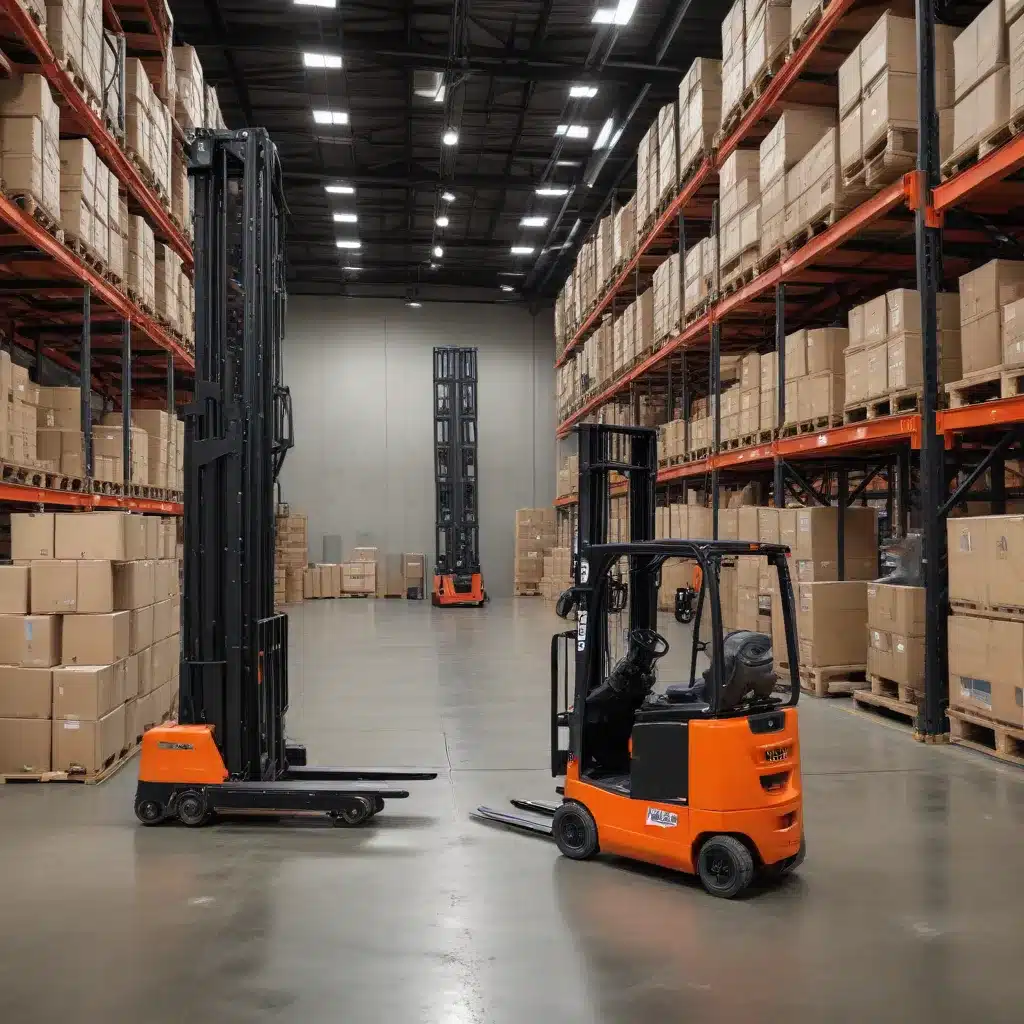
The Sustainable Shift: Embracing Electrification in Material Handling
The material handling industry is undergoing a transformative shift, with electrification emerging as a viable and increasingly attractive solution for businesses seeking to enhance efficiency, reduce environmental impact, and future-proof their operations. As companies worldwide face mounting pressure to embrace sustainability and decarbonization initiatives, the adoption of electric forklifts has become a strategic priority.
Electrification, the process of substituting electric power in place of fossil fuel sources, offers a multitude of benefits that are revolutionizing the material handling landscape. Unlike traditional internal combustion engine (ICE) forklifts, electric models provide clean, zero-emission power, aligning perfectly with the growing demand for environmentally conscious business practices. This shift not only supports sustainability goals but also delivers tangible advantages in terms of performance, productivity, and operational cost savings.
The Rise of Lithium-Ion Power: Overcoming Past Limitations
One of the key developments driving the surge in electric forklift adoption is the advent of advanced lithium-ion battery technology. Unlike their lead-acid predecessors, today’s lithium-ion batteries offer a remarkable leap in energy density, power transfer, and service life, effectively eliminating the performance gap between electric and ICE-powered forklifts.
Advancements in lithium-ion technology have enabled the emergence of electric forklifts capable of handling even the most demanding, heavy-duty applications. Counterbalanced forklifts with integrated lithium-ion power are now available in capacity ranges from 15,500 to 36,000 pounds, bridging the gap between electric and traditional ICE models. This remarkable progress in battery performance has made electrification a realistic option for a wide array of industries, including lumber, agriculture, steel, and ports.
Powering Productivity and Sustainability
The benefits of electric forklifts extend far beyond environmental considerations. By leveraging the unique characteristics of electrification, businesses can unlock substantial improvements in operational efficiency and productivity.
One of the most significant advantages of electric forklifts is their reduced maintenance requirements compared to their ICE counterparts. With fewer moving parts and no internal combustion engine, electric trucks require less servicing and downtime, allowing operators to spend more time working and less time waiting. This reduced maintenance load can be particularly valuable in an era of skilled labor shortages, as it eases the burden on technicians and ensures smoother operations.
Moreover, electric forklifts offer enhanced operator comfort and performance. The absence of engine noise and vibrations, as well as the elimination of tailpipe emissions, creates a more ergonomic and pleasant work environment. Improved visibility, easy entry and exit, and intuitive controls further contribute to operator efficiency and job satisfaction.
Charging Ahead: Addressing Infrastructure and Grid Capacity Challenges
As the adoption of electric forklifts accelerates, considerations around charging infrastructure and grid capacity have become increasingly important. Factors such as local utility grid stability and charging time requirements must be carefully evaluated to ensure seamless integration and uninterrupted operations.
In areas with weak electric grids, the risk of brownouts or power interruptions can disrupt carefully timed charging schedules, potentially slowing down operations. To mitigate these challenges, innovative solutions like hydrogen fuel cells are emerging as complementary technologies. Fuel cell-powered forklifts offer the simplicity and sustained performance of ICE models, combined with the zero-emission benefits and reduced maintenance of electric drivetrains. The rapid refueling capabilities of hydrogen fuel cells can help overcome the limitations of battery charging, further enhancing the operational efficiency of electric material handling equipment.
Driving Decarbonization and Operator-Centric Design
The shift towards electric forklifts is not solely driven by environmental concerns; it also aligns with the industry’s evolving priorities, including the need to attract and retain skilled labor. By offering a more comfortable, safer, and technologically advanced work environment, electric forklifts can become a valuable tool in addressing the labor shortage challenges facing many organizations.
Ergonomic features, such as improved visibility, easy entry and exit, and intuitive controls, remain crucial considerations for both electric and ICE-powered forklifts. Prioritizing operator-centric design ensures that the adoption of electric technology does not compromise the fundamental requirements of material handling tasks.
The Future is Electric: Market Trends and Industry Outlook
The shift towards electric forklifts is gaining significant momentum, with market adoption reaching new heights. In 2023, electric models accounted for over a third of all sit-down counterbalanced forklift purchases, representing an 8% increase in a single year, according to the Industrial Truck Association (ITA) factory booking data.
This rapid growth in electric forklift adoption reflects the industry’s recognition of the numerous benefits that electrification offers. From enhanced sustainability and environmental responsibility to improved productivity and operational efficiency, electric forklifts are proving to be a compelling solution for businesses seeking to future-proof their material handling operations.
As the material handling industry continues to evolve, the role of electric forklifts will only become more prominent. Ongoing technological advancements, supportive policies and regulations, and the increasing focus on environmental stewardship will further drive the widespread adoption of this transformative technology. By embracing electric forklifts, businesses can power the future of material handling, maximizing efficiency and sustainability while contributing to a greener, more resilient supply chain.
Conclusion: A Sustainable, Efficient, and Operator-Centric Future
The material handling industry stands at the cusp of a transformative shift, with electric forklifts emerging as a compelling solution to address the pressing challenges of sustainability, productivity, and labor optimization. By harnessing the power of advanced lithium-ion technology and innovative alternatives like hydrogen fuel cells, businesses can unlock a future of cleaner, more efficient, and operator-centric material handling operations.
As the industry continues to evolve, the adoption of electric forklifts will play a crucial role in driving decarbonization efforts, enhancing operational resilience, and attracting and retaining a skilled workforce. By embracing this sustainable and technologically-advanced solution, organizations can position themselves for long-term success and actively contribute to a more sustainable, efficient, and future-proof material handling landscape.
For more insights and practical tips on forklift reviews, safety, maintenance, and industry trends, be sure to explore the comprehensive resources available at Forklift Reviews.

